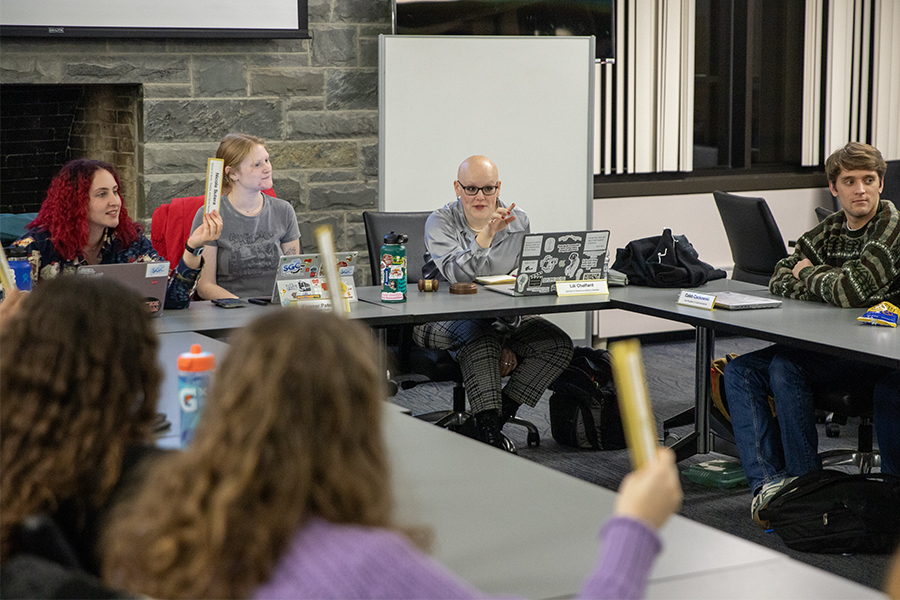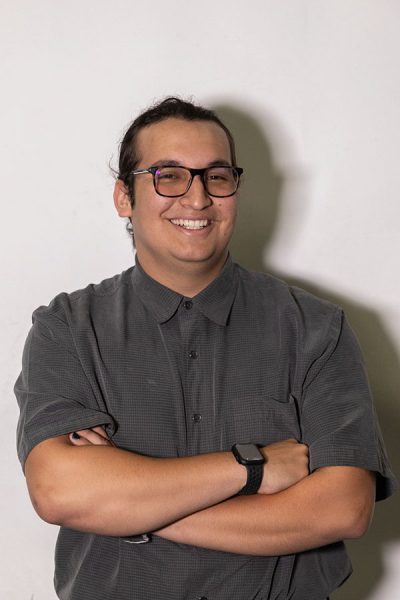The Ithaca College Student Governance Council met Nov. 27 to learn about the Office of Access, Opportunity & Achievement (OAOA), confirm a new member to the Appropriations Committee and pass a new amendment to the SGC constitution.
Sara Dingee works in the OAOA as the program coordinator for the Collegiate Science & Technology Entry Program (CSTEP) and is the campus director of the Louis Stokes Alliance for Minority Participation (LSAMP) Program. Dingee met with the SGC to discuss the different programs in the office and how students at the college can get involved.
“We are an office that houses currently five different grants,” Dingee said. “All of them are opportunity grants, meaning that they are funding that’s given to our office with the intention of trying to expand access and equity in higher education.”
The OAOA was formerly known as the Office of State Grants and houses the Higher Education Opportunity Program (HEOP), the Careers in Science, Technology, Engineering and Mathematics (C-STEM) Program and the Foster Youth College Success Initiative (FYCSI).
HEOP is a pre-admission program that provides support services to Ithaca College students and transfer students who meet the grant’s requirements. HEOP and FYCSI are primarily for students who would otherwise be unable to attend the college because of academic and economic circumstances.
C-STEP, C-STEM and LSAMP each have different formal application processes. Dingee recommends students reach out to the office so someone in the office can help identify which program is best for the student. Dingee said that following the application and acceptance into the program, students will receive grant funding through the OAOA.
C-STEP, HEOP and FYCSI are funded by the New York State Education Department. C-STEM is the only program funded by the college and LSAMP is funded by the National Science Foundation. Dingee said the programs provide not only financial support but an additional community for students.
“All of these programs come with a counselor in our office,” Dingee said. “The idea is you’re a member of the office, you’re a part of a community [and] there are people who are looking out for you, whether that’s officially their job or they are also part of the community.”
Dingee said the programs also allow students to connect with people with similar backgrounds in their student lounge space and through events.
“We go to Albany and we do advocacy so that students can practice learning how to advocate for funding,” Dingee said. “We have service opportunities where we go out into the community at elementary schools and high schools, typically in some kind of STEM-related community service project that we do with students.”
Dingee said there is a significant financial component to each of the programs, but it depends on the program. HEOP is the only one that has significant funds for tuition, while the other programs provide funding for other aspects depending on student needs.
“We always pay for required textbooks and course materials,” Dingee said. “We can pay for winter and summer courses, and digital academic supplies. For students who are looking at graduate school, we can pay for things like the Kaplan Test Prep for the MCAT, their graduate school applications and other things that add up.”
Multiple SGC members asked Dingee how her office gets information out to students, and if her office tables at orientation.
Dingee said her office does not currently table at orientation events but hopes to implement that in upcoming years. Dingee said she is in contact with the academic department heads to let their students know about opportunities.
Dingee said she thinks many students could benefit from the services that her office provides and hopes to expand the scope of students who can join the programs in the future.
Sophomore Elle Wilcox, a double major in journalism and finance, was approved to the SGC Appropriations Committee, which works with the Office of Student Engagement to distribute funding to student organizations. Wilcox said she wants to learn more about the work that is done on the Appropriations Committee and see how clubs are implementing their funding into their activities. Wilcox said she benefited from funds provided by the Appropriations Committee when she went to the Society of Professional Journalists Convention in Las Vegas.
“I went on a trip earlier this year thanks to the Appropriations Committee, and it was interesting to see the process work,” Wilcox said. “To be able to clearly hear a student’s needs is so fulfilling and we can give people so much. You are giving them money, but you are also giving them experiences.”
Wilcox said she wants to provide similar opportunities for other students. The SGC then went into executive session and approved Wilcox to the committee.
Following the executive session, the SGC reviewed and passed a bill amending seven aspects of the constitution. The Organizational Review Committee, which includes sophomore senate chair Eleanor Paterson; sophomore Lili Chalfant, School of Communications senator; and first-year students Joslyn Forcione, School of Humanities and Sciences senator and Ava Casell-Lapetina and Eva Horst, Class of 2027 senators, co-sponsored a bill amending the constitution. The amendment changed language in the SGC code of conduct and constitution, eliminating “intimidation” and replaced it with “coercion” in the code of conduct, as well as a change in wording from “leadership hierarchy” to “leadership structure” in the constitution. The amendment also altered confusion with the SGC meeting attendance policy and added motions to create a sub-speakers list or to forgo a speakers list.
Another change was to provide more information on how ex-officio positions interact with SGC. Ex-officio positions are non-voting members who report from other organizations to the SGC, including members from the Ithaca College Board of Trustees and the Alumni Association. The new amendment requires that ex-officio positions prepare at least one presentation per semester and present as a guest speaker. Students in the position will also be expected to meet with the SGC president or the executive board at least once per month and need to request a report from the SGC at least once per month.
“One of the things that Noah [Richardson, student liaison to the alumni board,] said was an issue is the lack of communication from SGC to them,” Paterson said. “So they can now pass it along to their boards to ask for more funding, ask for help on different things so there is not a disconnect in that.”
An adjustment to the election procedure was also put in place. Paterson said the Elections Committee will now notify electees of the results at 9 a.m., the first business day after elections close. Paterson said the electees will have 24 hours to accept or decline the position, and once all electees have accepted, the results will be shared with all students.
The changes come after concerns regarding the validity of the elections during Spring 2023. After the Spring 2023 elections, the Election Committee decided to withhold specific vote counts. However, after hearing many complaints from students, they released the counts which revealed that first-year student Matthew Williams — who was disqualified for violating policies about posting campaign materials — beat the elected president by 83 votes.
Senior Carli McConnell, president of the student body, said the elections procedures would also be reexamined in Spring 2024 to make sure vote counts are not being withheld from the student body.
“The members of the Elections Committee will have a discussion about the different points before the next elections that is more neatly laid out,” McConnell said. “Then we can go through line-by-line, step-by-step, and make sure that it’s very clear.”
The amendment was passed with eight in favor, zero opposed and four abstentions coming from Casell-Lapetina, Chalfant, Forcione and Horst.
The SGC is the sole representative body for the Ithaca College student community. The SGC can be contacted at [email protected].
















